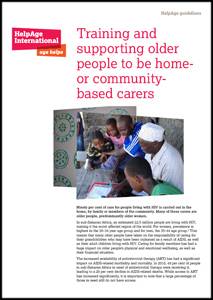HIV and AIDS guidelines
Download our guidelines on psychosocial support for older carers; protecting inheritance in multi-generation households; using peer education to inform older people about HIV; income-generation activities for older people living with HIV and providing training and support to older people to be carers.
Psychosocial support
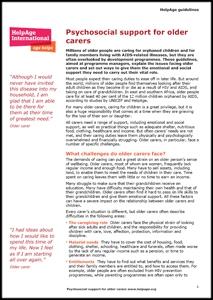 Psychosocial support for older carers: a summary (64 kb)
Psychosocial support for older carers: a summary (64 kb)
Most people expect their caring duties to ease off in later life. But around the world, millions of older people are caring for orphaned children and for family members living with AIDS-related illnesses.
Older carers face specific challenges, but they are often overlooked by development programmes.
These guidelines, aimed at programme managers, explain the issues facing older carers and set out ways to give them the emotional and social support they need to carry out their vital role.
Inheritance in multi-generational households
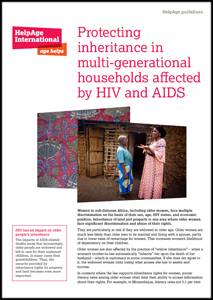 Protecting inheritance in multi-generational households affected by HIV and AIDS (1.23 mb)
Protecting inheritance in multi-generational households affected by HIV and AIDS (1.23 mb)
Women in sub-Saharan Africa, including older women, face multiple discrimination on the basis of their sex, age, HIV status, and economic position. Inheritance of land and property is one area where older women face significant discrimination and abuse of their rights.
This guideline explains that the inheritance rights of older women and children in households affected by HIV can be protected through support from paralegals, writing a will, and creating memory books.
Peer education
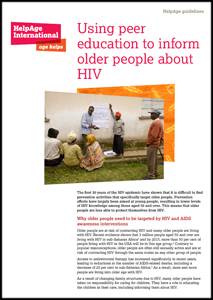 Using peer education to inform older people about HIV (946 KB)
Using peer education to inform older people about HIV (946 KB)
The first 30 years of the HIV epidemic have shown that it is difficult to find prevention activities that specifically target older people. Prevention efforts have largely been aimed at young people, resulting in lower levels of HIV knowledge among those aged 50 and over. This means that older people are less able to protect themselves from HIV.
Older people are at risk of contracting HIV, may be living with HIV, or providing care to children affected by HIV. It is crucial that they have access to information on HIV so that they can protect themselves and others. This guideline shows how peer education is an effective way of providing this information to older people.
Income-generating activities
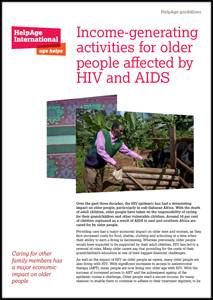 Income-generating activities for older people affected by HIV and AIDS (1.2 mb)
Income-generating activities for older people affected by HIV and AIDS (1.2 mb)
Around 50 per cent of children orphaned as a result of AIDS in east and southern Africa are cared for by older people.
Providing care has a major economic impact on older men and women affected by HIV, at a time when their ability to earn a living is decreasing. Programmes that encourage a range of income-generating activities, particularly small-scale loans accompanied by training in business skills, can help to mitigate the economic impact of HIV on older people.
Training and support to carers
Training and supporting older people to be home- or community-based carers (742 kb)
In sub-Saharan Africa, an estimated 22.5 million people are living with HIV, making it the worst affected region of the world.
Ninety per cent of care for people living with HIV is carried out in the home, by family or members of the community. Many of these carers are older people, predominantly older women.
This guideline explains the various challenges faced by older carers and the training and specific support they need.
More resources
Ageways 79: HIV and AIDS (850 kb)
Building bridges: a home-based care model for supporting older carers of people living with HIV (320 kb)
